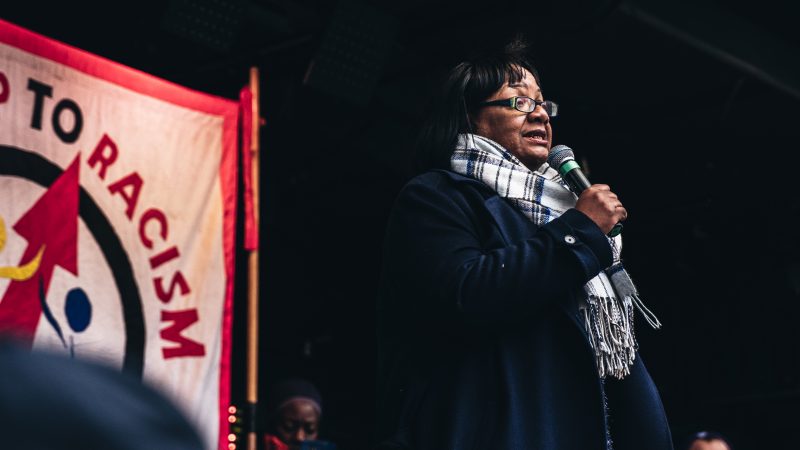
Labour MP Diane Abbott has used an anti-racism Black Lives Matter rally at Labour’s online conference ‘Connected’ to criticise the party’s failure to recruit Black staffers in its London headquarters.
Addressing the event this afternoon, the Hackney MP identified “three strands of activity which the Black Lives Matter movement should prompt the Labour Party to do more on” – the first being recruitment by the party.
“It’s astonishing to me that in 2020, you can walk into Southside – the Labour Party’s HQ on Victoria Street – and see hardly any Black people,” Abbott told attendees. “Southside is recruiting in one of the most diverse cities in the country and yet somehow, it doesn’t manage to recruit very many Black and minority ethnic people.
“You might say, what does it matter? It matters because very often the pipeline to going on to a representative role lies in working for the party, whether in Southside, through regional office, or a policy adviser.
“Frankly, when we’re talking about policies, when we’re talking about how the Labour Party runs and works, you need to have Black people in the room. The first thing we have to do is if we’re serious about supporting Black Lives Matter is to look at who we recruit nationally, regionally, and as individual councillors and MPs.”
The second strand Abbott talked about was representation, noting: “It’s always surprising to me, once you go outside of London, even in local parties where they’re very dependent on black minority ethnic votes, you’ll find hardly any [BAME] people in the management committee.
“There is more that can be done, not just to look at black and minority ethnic people as voting fodder, not just to rely on so-called community leaders, but to encourage black and minority ethnic people – including women, including young people – to be active in the party at a grassroots level.”
Abbott’s third strand was “putting racial justice at the heart of our policy-making”. The former shadow cabinet member criticised what she identified as an approach that is often taken by the Labour Party.
She said: “All too often, at the general election, at the last minute, you get some race manifesto. At the last minute people talk about people like me, and say is there a Black church we can visit or a Gurdwara we can visit? Is there a mosque we can visit?”
The former Shadow Home Secretary named policing (stop and search), education (“we need to decolonise the curriculum”) and health (particularly in Covid) as three key policy areas for racial justice.
Abbott also suggested there was value in protesters pulling down the statue of 17th-century slave trader Edward Colston in June. Keir Starmer said at the time that it was “completely wrong” to pull down the statue, though it “should have been taken down a long, long time ago”.
Commenting on the direct action today, Abbott said: “I’ve seen more debates about the role of slavery and British history since the Black Lives Matter pulled down the statue in Bristol than before. People are saying they were wrong to do it and do it in the wrong way – they achieved something.”
The Hackney North and Stoke Newington MP, the first Black woman to be elected to parliament, also told the event that the biggest challenge she has faced is racism – both racist abuse in having bricks thrown through her office windows and more recent online abuse.
She also reported having to deal with “assumptions” from colleagues, whom she described as “unwilling to challenge some of their presumptions and some of their attitudes” because “they say ‘we’re left-wing and we’re anti-racist'”.
At the Connected event, shadow minister Chi Onwurah talked about the challenge of “understanding the racist baggage” around her “without internalising it”, adding: “It was a good job I was standing [for parliament] in my 40s, and I had experience of not internalising other people’s racism.”
Kate Osamor, who was a shadow cabinet member for a period under Jeremy Corbyn’s leadership, said the Labour Party “doesn’t really recognise race and doesn’t understand that we come in all different shapes and sizes of Black women and men”.
Her mother is Baroness Martha Osamor, who was nominated as a potential party candidate by branches of the local Vauxhall Labour party in 1989 but not shortlisted by the party’s national ruling body. Kate Hoey was selected for the seat instead.
The Edmonton MP said: “I got into politics in a kind of unconventional way. I didn’t think I was going to get into politics because of the way my mum was treated and it goes back to what Diane said about the racism Black women in senior leadership roles within the party experience.
“And I saw that, first hand, seeing what my mum went through and seeing how unfortunately the party treated her and the movement that she was part of. When I got into politics, I wasn’t really allowed to have a voice which wasn’t associated with my mother.”
Osamor said there is currently a “burden of the party not understanding overt, covert, direct or indirect racism” – but that if Labour talks about race more, “it will make it easier for those of us who want to take up leadership roles at any level within the party”.
The event was chaired by Bell Ribeiro-Addy MP, and joined by Diane Abbott, Kate Osamor, Chi Onwurah, Unite the Union’s Susan Matthews, and councillor Jackie Taylor. It took place as part of Labour’s online conference replacement Connected.




More from LabourList
‘The hope that kills you’: Reflections from the final day in Gorton and Denton
MPs, union leaders and organisations react to ‘bruising’ Gorton and Denton result
A gory night for Labour